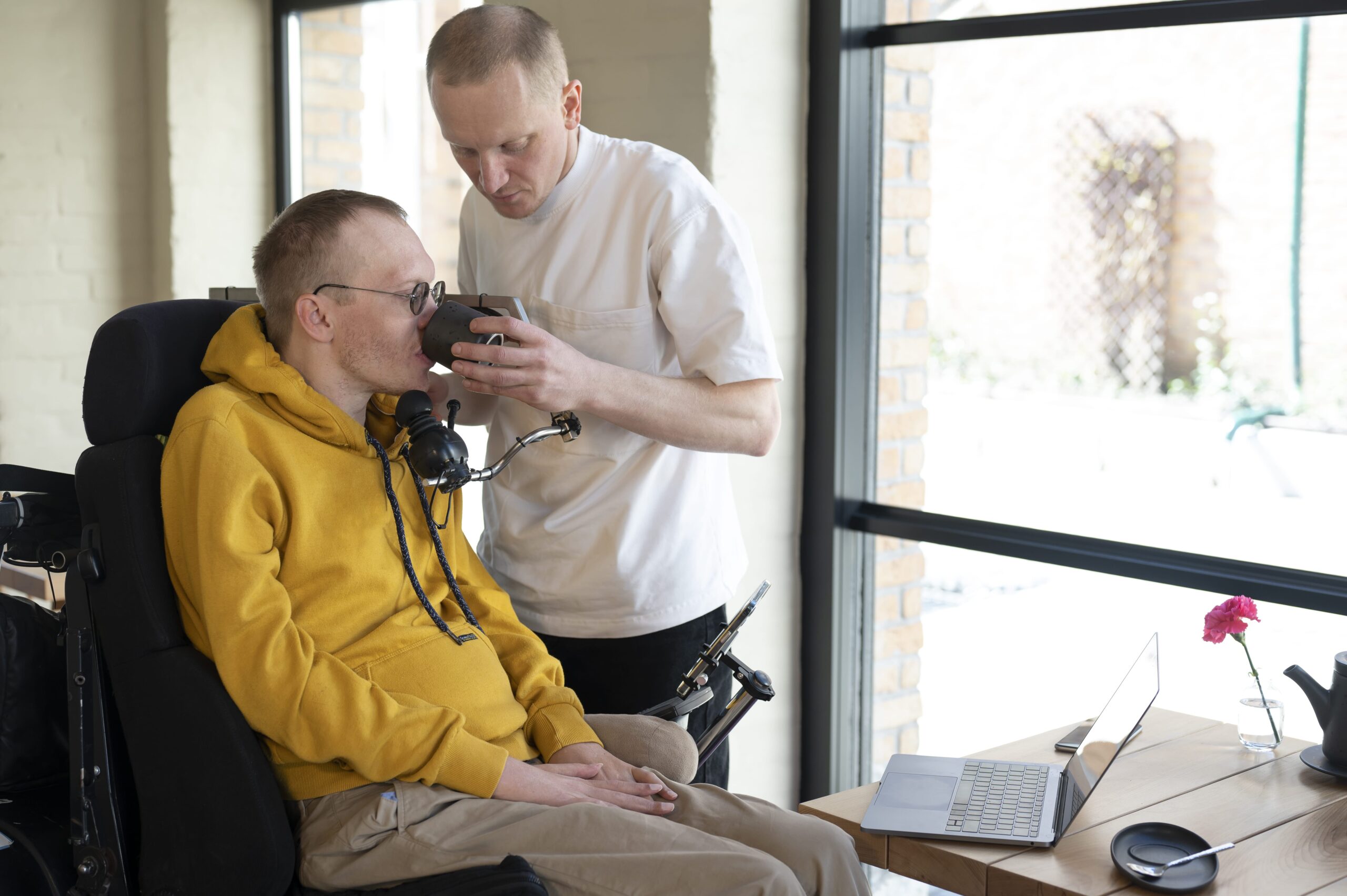We all require assistance from time to time. Having the right support allows us to focus on the big picture, such as our hopes, goals, and dreams. If you are approved for NDIS funding for assistance with daily living, you may be eligible to receive assistance with your daily personal activities or household tasks in order to improve your overall independence and life skills.
In this blog, we’ll explain how much funding the NDIS plans can allocate for daily living assistance, for what things and how they can be used, and also why this kind of support is so essential.
What is Core Support for NDIS?
The National Disability Insurance Scheme (NDIS) can be confusing for people with disability, their families, and carers, but it can provide you and your loved ones with whatever assistance you require.
You can complete daily tasks, work towards your goals, and manage your current disability-related needs with Core Supports. When you have NDIS core support funding, you can use it for all four support categories. You may find it difficult to find a flexible funding solution for consumables and transportation on occasion.
Category 1: Assistance with Daily Living
- Assists you in being as self-sufficient as possible at home.
- Funds activities such as meal preparation assistance, house cleaning, gardening, showering, and dressing.
- Respite care is also provided.
Category 2: Transport Allowance
If you are unable to use public transportation due to your disability, this option may be available to you.
- It covers the cost of appropriate transportation so you can access the services you require outside of your home.
- The NDIA or your Plan Manager will pay you or your transportation provider directly and in advance, usually fortnightly or monthly.
Category 3: Consumables
- Covers ‘off the shelf’ items such as nutrition, continence, colostomy bags, and dressing aids.
- It can also include inexpensive, low-risk, small assistive devices like a kettle stabiliser, a walker, sensory equipment, or apps for your smartphone, tablet, or, in some cases, an iPad or tablet.
- It can also cover expenses for an assistance dog, such as pet insurance and grooming.
- It can also fund interpreter services.
- An Occupational Therapist can assist you in determining what you require.
Category 4: Assistance with Social & Community Participation
- Supports your participation in community, social, and recreational activities.
- Covers the costs of participation but not the actual activity (the actual activity may be funded under the category ‘Increased Social & Community Participation (Category 9)’.
- Tickets to concerts or sporting events, for example, are unlikely to be covered, but you could use your funds to hire a support worker to assist you in attending these events.
Access to Ease: Understanding NDIS Core Supports
Discover how to enhance your everyday life with NDIS core supports. Reach out to us now for comprehensive guidance.
What is Assistance with Daily Life?
Assistance with Daily Living is a funding sub-category under Core Supports on the NDIS. The goal of this NDIS budget is to provide the assistance you require in your daily personal activities so that you can live as independently as possible in your home and community.
Because each person living with a disability has unique needs, the type of daily support participants receives will differ from one another. Assisting with Daily Life NDIS assistance is thus tailored to you and your specific needs. This way, everyone gets the assistance they need to live a more self-sufficient life.
The following types of assistance may be included in your NDIS Plan:
- Personal assistance on a daily basis
- Helping with household tasks
- Living in a shared apartment with others
- Living independently with assistance (SIL)
- Short-term assistance and lodging (or respite)
- There is home and community-based support available
What types of assistance are provided by Assistance with Daily Life?
When we talk about NDIS Assistance with Daily Life, we mean all of the tasks and activities we do on a daily basis. This includes getting out of bed and showering, eating meals, getting ready for the day, and leaving the house.
Here are some examples of how Assistance with Daily Life Support could look:
- Assist in getting ready for the day (getting out of bed, showering, getting dressed etc.)
- Assist with household chores (doing the dishes, cleaning or gardening)
- Help with meal preparation or payment for meal delivery services.
- Assist with getting around the neighbourhood and using public transportation.
What is not covered in this support?
- The cost of food or prepared meals (including delivered meals – the NDIS will only cover the cost of preparation and delivery)
- The price of household items like cleaning supplies
- Toiletries and cosmetics that are not related to your disability
- Payments for rent, board, or mortgage
- For instance, Tickets for events, concerts, and movies.
How does the NDIS help with daily living?
When it comes to the NDIS, daily living refers to all of the regular tasks and chores that must be completed during the course of a day, such as getting out of bed, showering, eating, and getting around.
The budget for Daily Living Assistance is intended to help you do all of these things. Your funds can be used to hire support staff to help with or supervise tasks. You can also use this money to hire helpers to do tasks for you if you are unable to do them yourself.
Eligibility for NDIS funding for daily living assistance
If you have ‘Assistance with Daily Life’ funded under your Core Support budget, you are eligible for this type of assistance. Search for ‘Assistance with Daily Life’ in your plan or ‘Daily Activities’ in your myplace portal to see if you already have funding. A good plan manager, such as Disability Plan Services, will be able to tell you if you’re eligible for this funding if it’s already in your plan and how much you’ve received.
How Can you Get Assistance with Daily Living?
Getting Help with Everyday Activities NDIS assistance is determined on a case-by-case basis. As a result, it is critical to be prepared for your NDIS planning meeting with your planner, where you will discuss why you need this support to meet your daily needs and achieve your goals. Gather supporting evidence, such as disability reports or recommendations from your doctor, that explain how such assistance will benefit you. If it is labelled as ” reasonable and necessary” in your circumstances, your LAC or NDIS Planner will include it in your plan.
How can a support coordinator assist you in making the most of this funding?
Support coordinators may be well-connected and can connect you with the right people for your needs. We have a team of experienced NDIS support coordinators at Disability Plan Services who will help you develop the skills you need to understand, implement, and use your plan. With over ten years of experience in the NDIS and disability sector, our team has built an extensive network of trusted providers across Southeast Queensland who can assist you in reaching your objectives. This means that we can assist you in connecting with and developing relationships with relevant service providers who can help you with your day-to-day tasks. Whether you require the services of a gardener or require assistance with meal preparation, our expert team of support coordinators will connect you with the assistance you require.
Embrace Independence: Navigate NDIS Core Supports
Let’s simplify your access to daily life assistance under NDIS core supports. Contact us today and embark on the path to independence.
Assisting you in living independently
If you can care for yourself but need some assistance, our Assistance with Daily Living services can help. You can remain in your own home if you receive Daily Living Assistance. A Wise Choice team member will come to your home for several hours each week, depending on how much assistance you require. Our knowledgeable and friendly staff can assist you with:
There are many ways to support you, including assistance to help you live independently in a home with support to do daily living activities like cooking your favourite meal, basic cleaning techniques to keep yourself organised, and perhaps a vegetable garden.
- Assistance with personal care tasks like grooming and medication administration reminders and prompts to help you stay healthy
- Making new friends and honing social skills in order to form new relationships
- Learning how to stay safe at home with as much or as little assistance as you require
- Assisting with the development of individual skills and the achievement of goals
- Assistance with budgeting goal setting
- Travel training skills so you can travel independently and confidently, or transportation assistance if needed.
FAQ’s
Why are the Supports for Daily Living different in each NDIS plan?
The level, type, and cost of support funded for Assistance with Daily Living are determined by the specific support needs of each participant. Some participants have more complex needs and thus require more support in daily life, whereas others may only require assistance with specific tasks.
Why are Supports for Daily Living listed under both Core Supports and Capacity Building in an NDIS plan?
The type of support covered by Core Supports is assistance that is necessary and required for a participant to complete daily activities that they would not be able to do it comfortably or safely on their own – thus covering the cost of a support worker to assist them.
Capacity Building support focuses on developing a participant’s skill set so that they can develop independent living skills and reduce the level of support required on a daily basis, thus covering the cost of assessments, therapy, and training.
Is Wise Choice available 24 hours a day, seven days a week?
We are always available to you! With a 24/7 support team, we ensure that all of our SIL and SDA residents have access to help not only in emergencies but also when they need to talk to someone.



